| Listing 1 - 10 of 24 | << page >> |
Sort by
|
Book
ISBN: 3110475456 3110476312 9783110476316 9783110475456 3110475421 Year: 2016 Publisher: Berlin/Boston, GERMANY De Gruyter
Abstract | Keywords | Export | Availability | Bookmark
 Loading...
Loading...Choose an application
- Reference Manager
- EndNote
- RefWorks (Direct export to RefWorks)
The purpose of this book is to present results on the subject of weak convergence in function spaces to study invariance principles in statistical applications to dependent random variables, U-statistics, censor data analysis. Different techniques, formerly available only in a broad range of literature, are for the first time presented here in a self-contained fashion. Contents:Weak convergence of stochastic processesWeak convergence in metric spacesWeak convergence on C[0, 1] and D[0,∞)Central limit theorem for semi-martingales and applicationsCentral limit theorems for dependent random variablesEmpirical processBibliography
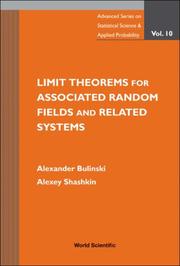
ISBN: 1281918792 9786611918798 981270941X 9789812709417 9789812709400 9812709401 9781281918796 6611918795 Year: 2007 Volume: 10 Publisher: New Jersey World Scientific
Abstract | Keywords | Export | Availability | Bookmark
 Loading...
Loading...Choose an application
- Reference Manager
- EndNote
- RefWorks (Direct export to RefWorks)
This volume is devoted to the study of asymptotic properties of wide classes of stochastic systems arising in mathematical statistics, percolation theory, statistical physics and reliability theory. Attention is paid not only to positive and negative associations introduced in the pioneering papers by Harris, Lehmann, Esary, Proschan, Walkup, Fortuin, Kasteleyn and Ginibre, but also to new and more general dependence conditions. Naturally, this scope comprises families of independent real-valued random variables. A variety of important results and examples of Markov processes, random measures
Random fields. --- Limit theorems (Probability theory) --- Probabilities --- Fields, Random --- Stochastic processes --- Random fields --- Champs aléatoires --- Théorèmes limites (Théorie des probabilités)
Book
ISBN: 3110458713 9783110458947 3110458942 9783110458718 3110458705 9783110458701 9783110458930 3110458934 9783110458701 3110458705 Year: 2018 Publisher: Berlin Boston
Abstract | Keywords | Export | Availability | Bookmark
 Loading...
Loading...Choose an application
- Reference Manager
- EndNote
- RefWorks (Direct export to RefWorks)
The general topic of this book is the ergodic behavior of Markov processes. A detailed introduction to methods for proving ergodicity and upper bounds for ergodic rates is presented in the first part of the book, with the focus put on weak ergodic rates, typical for Markov systems with complicated structure. The second part is devoted to the application of these methods to limit theorems for functionals of Markov processes. The book is aimed at a wide audience with a background in probability and measure theory. Some knowledge of stochastic processes and stochastic differential equations helps in a deeper understanding of specific examples. Contents Part I: Ergodic Rates for Markov Chains and ProcessesMarkov Chains with Discrete State SpacesGeneral Markov Chains: Ergodicity in Total VariationMarkovProcesseswithContinuousTimeWeak Ergodic Rates Part II: Limit TheoremsThe Law of Large Numbers and the Central Limit TheoremFunctional Limit Theorems
Markov processes --- Analysis, Markov --- Chains, Markov --- Markoff processes --- Markov analysis --- Markov chains --- Markov models --- Models, Markov --- Processes, Markov --- Stochastic processes --- Markov processes. --- ergodic rates. --- ergodicity. --- limit theorems.
Book
ISBN: 9780511581274 9780521884273 9781107606609 9780511580956 0511580959 9780511579554 0511579551 0511581270 0521884276 1107200318 113963769X 1282302779 9786612302770 0511580630 0511578814 0511580290 1107606608 9781107200319 9781282302778 6612302771 9780511580635 9780511578816 9780511580291 Year: 2009 Publisher: New York : Cambridge University Press,
Abstract | Keywords | Export | Availability | Bookmark
 Loading...
Loading...Choose an application
- Reference Manager
- EndNote
- RefWorks (Direct export to RefWorks)
Randomized algorithms have become a central part of the algorithms curriculum, based on their increasingly widespread use in modern applications. This book presents a coherent and unified treatment of probabilistic techniques for obtaining high probability estimates on the performance of randomized algorithms. It covers the basic toolkit from the Chernoff-Hoeffding bounds to more sophisticated techniques like martingales and isoperimetric inequalities, as well as some recent developments like Talagrand's inequality, transportation cost inequalities and log-Sobolev inequalities. Along the way, variations on the basic theme are examined, such as Chernoff-Hoeffding bounds in dependent settings. The authors emphasise comparative study of the different methods, highlighting respective strengths and weaknesses in concrete example applications. The exposition is tailored to discrete settings sufficient for the analysis of algorithms, avoiding unnecessary measure-theoretic details, thus making the book accessible to computer scientists as well as probabilists and discrete mathematicians.
Random variables. --- Distribution (Probability theory) --- Limit theorems (Probability theory) --- Algorithms. --- Algorism --- Algebra --- Arithmetic --- Probabilities --- Distribution functions --- Frequency distribution --- Characteristic functions --- Chance variables --- Stochastic variables --- Variables (Mathematics) --- Foundations
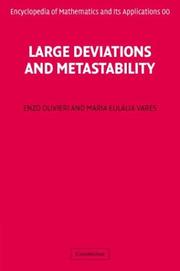
ISBN: 9780511543272 9780521591638 0511080646 9780511080647 0511079885 9780511079887 0511543271 0521591635 1280417188 9781280417184 0521591635 1107127424 9786610417186 051117070X 0511206674 0511297858 Year: 2005 Volume: 100 Publisher: New York: Cambridge university press,
Abstract | Keywords | Export | Availability | Bookmark
 Loading...
Loading...Choose an application
- Reference Manager
- EndNote
- RefWorks (Direct export to RefWorks)
The book provides a general introduction to the theory of large deviations and a wide overview of the metastable behaviour of stochastic dynamics. With only minimal prerequisites, the book covers all the main results and brings the reader to the most recent developments. Particular emphasis is given to the fundamental Freidlin-Wentzell results on small random perturbations of dynamical systems. Metastability is first described on physical grounds, following which more rigorous approaches to its description are developed. Many relevant examples are considered from the point of view of the so-called pathwise approach. The first part of the book develops the relevant tools including the theory of large deviations which are then used to provide a physically relevant dynamical description of metastability. Written to be accessible to graduate students, this book provides an excellent route into contemporary research.
Large deviations. --- Stability. --- Dynamics --- Mechanics --- Motion --- Vibration --- Benjamin-Feir instability --- Equilibrium --- Deviations, Large --- Limit theorems (Probability theory) --- Statistics --- Mathematical statistics --- Large deviations --- Stability
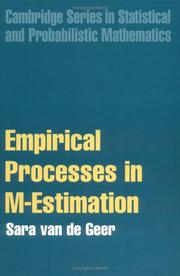
ISBN: 052165002X 9780521650021 9780521123259 0521123259 Year: 2000 Publisher: Cambridge: Cambridge university press,
Abstract | Keywords | Export | Availability | Bookmark
 Loading...
Loading...Choose an application
- Reference Manager
- EndNote
- RefWorks (Direct export to RefWorks)
"The theory of empirical processes provides tools for the development of asymptotic theory in (non-parametric) statistical models, and possibly the unified treatment of a number of them. This book reveals the relation between the asymptotic behaviour of M-estimators and the complexity of parameter space. Virtually all results are proved using only elementary ideas developed within the book; there is minimal recourse to abstract theoretical results. To make the results concrete, a detailed treatment is presented for two important examples of M-estimation, namely maximum likelihood and least squares. The theory also covers estimation methods using penalties and sieves." "Many illustrative examples are given, including the Grenander estimator, estimation of functions of bounded variation, smoothing splines, partially linear models, mixture models and image analysis." "For Graduate students and professionals in statistics, as well as those with an interest in applications to such areas as econometrics, medical statistics, etc."--Jacket.
Nonparametric statistics. --- Estimation theory. --- Limit theorems (Probability theory) --- mathematische modellen, toegepast op economie --- waarschijnlijkheidsleer --- wiskundige statistiek --- Probabilities --- Estimating techniques --- Least squares --- Mathematical statistics --- Stochastic processes --- Distribution-free statistics --- Statistics, Distribution-free --- Statistics, Nonparametric --- Nonparametric statistics --- Estimation theory --- Limit theorems (Probability theory).
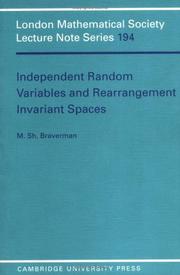
ISBN: 1139884972 1107366925 1107371570 1107362016 1107368804 1299404642 1107364469 0511662343 9781107362017 9780511662348 0521455154 9780521455152 Year: 1994 Publisher: Cambridge: Cambridge university press,
Abstract | Keywords | Export | Availability | Bookmark
 Loading...
Loading...Choose an application
- Reference Manager
- EndNote
- RefWorks (Direct export to RefWorks)
The subject of this book lies on the boundary between probability theory and the theory of function spaces. Here Professor Braverman investigates independent random variables in rearrangement invariant (r.i.) spaces. The significant feature of r.i. spaces is that the norm of an element depends on its distribution only, and this property allows the results and methods associated with r.i. spaces to be applied to problems in probability theory. On the other hand, probabilistic methods can also prove useful in the study of r.i. spaces. In this book new techniques are used and a number of interesting results are given. Most of the results are due to the author but have never before been available in English. Here they are all presented together in a volume that will be essential reading for all serious researchers in this area.
Random variables. --- Rearrangement invariant spaces. --- Inequalities (Mathematics) --- Processes, Infinite --- Invariant spaces, Rearrangement --- Spaces, Rearrangement invariant --- Function spaces --- Chance variables --- Stochastic variables --- Probabilities --- Variables (Mathematics) --- Probability --- Random variables --- Rearrangement invariant spaces --- Variables aléatoires --- Sous espaces invariants --- 519.214 --- 519.214 Limit theorems --- Limit theorems
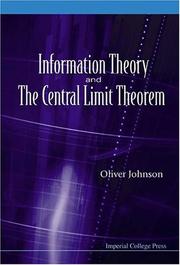
ISBN: 1281866431 9786611866433 1860945376 9781860945373 9781860944734 1860944736 Year: 2004 Publisher: London : River Edge, NJ : Imperial College Press ; Distributed by World Scientific Publishing,
Abstract | Keywords | Export | Availability | Bookmark
 Loading...
Loading...Choose an application
- Reference Manager
- EndNote
- RefWorks (Direct export to RefWorks)
This book provides a comprehensive description of a new method of proving the central limit theorem, through the use of apparently unrelated results from information theory. It gives a basic introduction to the concepts of entropy and Fisher information, and collects together standard results concerning their behaviour. It brings together results from a number of research papers as well as unpublished material, showing how the techniques can give a unified view of limit theorems.
Central limit theorem. --- Information theory --- Probabilities. --- Probability --- Statistical inference --- Combinations --- Mathematics --- Chance --- Least squares --- Mathematical statistics --- Risk --- Communication theory --- Communication --- Cybernetics --- Asymptotic distribution (Probability theory) --- Limit theorems (Probability theory) --- Statistical methods.
Book
ISBN: 3642433960 364236067X 3642360688 Year: 2013 Publisher: New York : Springer,
Abstract | Keywords | Export | Availability | Bookmark
 Loading...
Loading...Choose an application
- Reference Manager
- EndNote
- RefWorks (Direct export to RefWorks)
Limit theorems and asymptotic results form a central topic in probability theory and mathematical statistics. New and non-classical limit theorems have been discovered for processes in random environments, especially in connection with random matrix theory and free probability. These questions and the techniques for answering them combine asymptotic enumerative combinatorics, particle systems and approximation theory, and are important for new approaches in geometric and metric number theory as well. Thus, the contributions in this book include a wide range of applications with surprising connections ranging from longest common subsequences for words, permutation groups, random matrices and free probability to entropy problems and metric number theory. The book is the product of a conference that took place in August 2011 in Bielefeld, Germany to celebrate the 60th birthday of Friedrich Götze, a noted expert in this field.
Limit theorems (Probability theory) -- Congresses. --- Mathematics --- Physical Sciences & Mathematics --- Mathematical Statistics --- Probabilities --- Number theory. --- Mathematical models. --- Number study --- Numbers, Theory of --- Probability --- Statistical inference --- Mathematics. --- Functional analysis. --- Probabilities. --- Probability Theory and Stochastic Processes. --- Functional Analysis. --- Number Theory. --- Algebra --- Combinations --- Chance --- Least squares --- Mathematical statistics --- Risk --- Distribution (Probability theory. --- Functional calculus --- Calculus of variations --- Functional equations --- Integral equations --- Distribution functions --- Frequency distribution --- Characteristic functions --- Limit theorems (Probability theory) --- Gotze, Friedrich.
Book
ISBN: 3642033105 3642033113 Year: 2010 Publisher: Berlin, Heidelberg : Springer Berlin Heidelberg : Imprint: Springer,
Abstract | Keywords | Export | Availability | Bookmark
 Loading...
Loading...Choose an application
- Reference Manager
- EndNote
- RefWorks (Direct export to RefWorks)
The theory of large deviations deals with the evaluation, for a family of probability measures parameterized by a real valued variable, of the probabilities of events which decay exponentially in the parameter. Originally developed in the context of statistical mechanics and of (random) dynamical systems, it proved to be a powerful tool in the analysis of systems where the combined effects of random perturbations lead to a behavior significantly different from the noiseless case. The volume complements the central elements of this theory with selected applications in communication and control systems, bio-molecular sequence analysis, hypothesis testing problems in statistics, and the Gibbs conditioning principle in statistical mechanics. Starting with the definition of the large deviation principle (LDP), the authors provide an overview of large deviation theorems in ${{m I!R}}^d$ followed by their application. In a more abstract setup where the underlying variables take values in a topological space, the authors provide a collection of methods aimed at establishing the LDP, such as transformations of the LDP, relations between the LDP and Laplace's method for the evaluation for exponential integrals, properties of the LDP in topological vector spaces, and the behavior of the LDP under projective limits. They then turn to the study of the LDP for the sample paths of certain stochastic processes and the application of such LDP's to the problem of the exit of randomly perturbed solutions of differential equations from the domain of attraction of stable equilibria. They conclude with the LDP for the empirical measure of (discrete time) random processes: Sanov's theorem for the empirical measure of an i.i.d. sample, its extensions to Markov processes and mixing sequences and their application. The present soft cover edition is a corrected printing of the 1998 edition. Amir Dembo is a Professor of Mathematics and of Statistics at Stanford University. Ofer Zeitouni is a Professor of Mathematics at the Weizmann Institute of Science and at the University of Minnesota.
Electronic books. -- local. --- Large deviations. --- Limit theorems (Probability theory). --- Civil & Environmental Engineering --- Operations Research --- Engineering & Applied Sciences --- Limit theorems (Probability theory) --- Deviations, Large --- Mathematics. --- System theory. --- Probabilities. --- Systems Theory, Control. --- Probability Theory and Stochastic Processes. --- Probabilities --- Statistics --- Systems theory. --- Distribution (Probability theory. --- Distribution functions --- Frequency distribution --- Characteristic functions --- Probability --- Statistical inference --- Combinations --- Mathematics --- Chance --- Least squares --- Mathematical statistics --- Risk --- Systems, Theory of --- Systems science --- Science --- Philosophy
| Listing 1 - 10 of 24 | << page >> |
Sort by
|

 Search
Search Feedback
Feedback About UniCat
About UniCat  Help
Help News
News